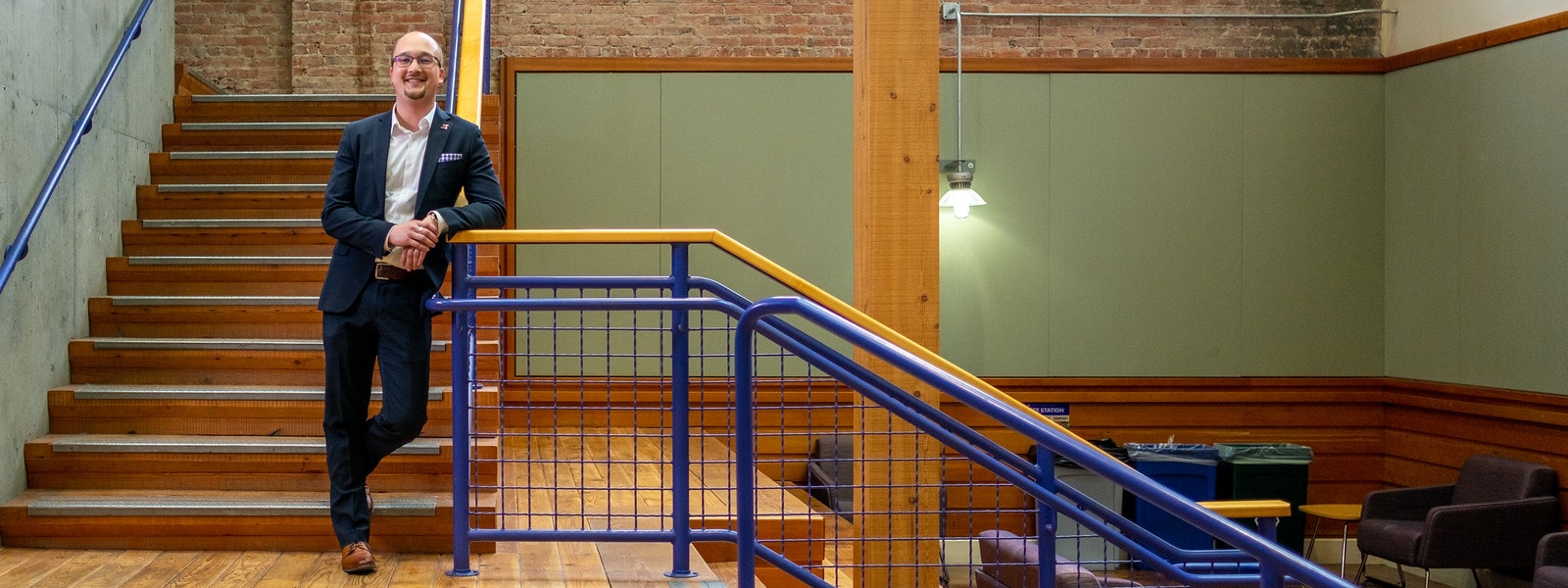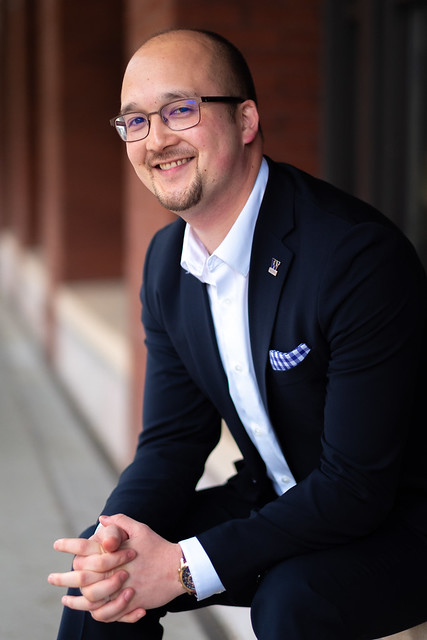
Higher (Education) Calling
Jimmy McCarty, UW Tacoma's new director of the Center for Equity and Inclusion, has a vision to make the space more creative, interactive and collaborative.
This Section's arrow_downward Theme Info Is:
- Background Image: ""
- Theme: "light-theme"
- Header Style: "purple_dominant"
- Card Height Setting: "consistent_row_height"
- Section Parallax: "0"
- Section Parallax Height: ""

-- Jimmy McCarty.
Jimmy McCarty is UW Tacoma’s new director of the Center for Equity and Inclusion. Flash back 17 years: in the fall of 2001, McCarty worked as a painter and sandblaster at the Puget Sound Naval Shipyard in Bremerton, Washington. Life for McCarty, and for countless others, changed as a result of the 9/11 terrorist attacks. The difference between the McCarty of today and the one of 17 years ago started not long after that particular Tuesday turned to Wednesday.
The attacks and the US response, specifically the war in Iraq, led McCarty to rethink his professional path. “I felt the war in Iraq was unjust,” he said. “Here I am working for the government, for the military in the midst of this and it gave me pause.” McCarty ultimately decided to go to college. “I went back to school with the idea that I would become a minister or preacher,” he said.
McCarty headed south to Malibu, California, and Pepperdine University. “Neither of my parents went to college,” he said. “My dad was a soldier, my mom worked in fast food restaurants and I didn’t really know what I was getting into.” McCarty was born in Korea but grew up in Spanaway. The move to Malibu exposed him to a different reality. “I was surrounded by wealth, surrounded by people who came from very different backgrounds than me, both class and race-wise,” he said.
McCarty describes his undergraduate experience as life-changing. “I worked at a historically black church in South Central Los Angeles doing racial justice and racial reconciliation work,” he said. Meanwhile, in the classroom, McCarty’s focus on social justice issues opened his eyes to a new level of understanding. “I saw the need for understanding problems faced by communities of color, not just through individualistic lenses, but through social and structural lenses and about the need for justice before there can be anything like reconciliation,” he said.
Growing up, McCarty was told many times he should become a pastor. “Trusted elders in my life suggested I had skills in this area and should consider the ministry,” he said. McCarty’s decision to change direction and pursue a life in higher education come down to a few reasons. “I had these inner urges to pursue a different path,” he said. “Also, working at that church in this underserved, poor neighborhood while I’m studying religion and theology transformed, for me, my idea of what it meant to go into the ministry.”
McCarty earned a bachelor’s in religion from Pepperdine. He went on to complete a master’s in ethics from Claremont School of Theology and a Ph.D. in ethics and society from Emory University. McCarty’s dissertation focused on transitional justice. “Basically, the focus was on what you do build a just peace after big events of violence,” he said. McCarty’s dissertation work took him to Africa. “I worked as a research assistant and volunteer at a non-governmental organization in Kenya,” he said. “I also did some research around the Truth and Reconciliation Commission in South Africa and human rights law.”
Following completion of his doctorate, McCarty took a position as Campus Minister for Social Justice at Seattle University. This was the summer of 2014. “Eric Garner was killed in New York not long after I started and Michael Brown was killed in Ferguson, Missouri a few weeks later,” said McCarty. Those two incidents helped launch the Black Lives Matter movement. “Pretty early on I collaborated with a colleague who had traveled to St. Louis in the wake of Michael Brown’s death,” said McCarty. “Together we organized different Black Lives Matter events on campus.”
During his time at Seattle University McCarty took over as director of the Office of Multicultural Affairs. “A lot of the work I did in that role was focused on trying to create a safe campus and provide resources for our undocumented students,” he said. “We also launched a comprehensive food security program, including a food pantry, and a couple of high-profile events for our LGBTQ students.”
McCarty started at UW Tacoma in February of this year — kind of. “We were basically shut down my first few weeks because of the snow,” he said. Among McCarty’s first orders of business — finding a new home for the Center. “One of the big lifts before us is fulfilling the promise that was made to students in response to their activism about relocating the Center to a larger, more central space, that will allow us to do more creative, interactive and collaborative programming,” said McCarty. “We’re working with a number of units on campus to make this happen.”
Beyond this, McCarty has plans to strengthen the Center’s programming around student persistence and success. “In the past we’ve had mentoring programs on campus and we’re hoping to really ramp that up in ways that are more than mentoring,” he said. “We’re looking at a variety of high-impact practices for students to help them thrive as students here.”
Central to McCarty’s mission is ensuring students, faculty, staff and community partners have a clear understanding of what it means to be diverse and equitable. “I’m looking forward to building communities of solidarity across communities of identity,” he said. “I think people tend to think of offices like the CEI as only being about race and gender but that is not how we conceive our work. You can be minoritized on campus in different ways, say if you’re a vet or first-generation student.”
McCarty left the Puget Sound Naval Shipyard in 2003. Since then he’s spent the majority of his professional life examining issues of race, religion and social justice. All of his studying, thinking and participating in social justice issues as taught innumerable lessons but one stands out:
“Diversity is really hard,” he said. “If we act like it’s easy, and it’s simple, and you just have to be nice, and think you’re tolerant of people who are different than you, then we won’t achieve anything looking like a truly inclusive or equitable campus. Diversity, when it’s done well, is a beautiful part of the human experience but it doesn’t happen just because we want it to. It only happens when we’re very intentional and work hard at it.”
Recent news
Main Content
Gathering Strength
News Tags on this arrow_upward Story:
- None
Main Content
UW Tacoma Enrollment up 4% for Autumn 2024
News Tags on this arrow_upward Story:
- None
Main Content
Celebrating First Gen
News Tags on this arrow_upward Story:
- None



